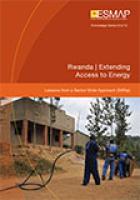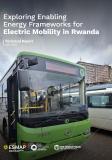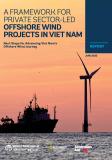Publications

In recent years, different approaches to providing aid have emerged. The sector-wide approach (SWAp) is a country-led, results-focused framework that brings together development partners and other stakeholders to coordinate aid within a sector. This approach aims to support country and government leadership in sector policy and planning, utilizing government systems and procedures and an agreed expenditure program. SWAps have traditionally been used to coordinate investments in schools and hospitals, but recently have been applied to other infrastructure sectors.
This report provides a number of key lessons realized from the Rwanda Energy SWAp for development partners and governments considering using such an approach. Country and government ownership and leadership is essential for efficient program planning and implementation, as is an alignment with national priorities and policies. Accurate data analysis to determine the costs and benefits is essential, as well as a clear picture of the technical and financial investments required.
Overall, the experience in Rwanda shows that SWAps in the energy sector can achieve success. Access to energy within the country has increased and more than US$200 million has been raised toward the costs of the electrification program.
Related Links



